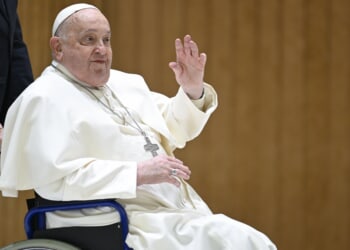A very Happy Easter to you all.
“Christ is risen, Hallelujah” as priests, and Christian worshippers across the UK will be saying today.
At this point I should be as honest as possible.
Whilst I’m very well versed in all things to do with ‘Anglicanism’ and Christianity I cannot pretend a very strong faith. My late father was a vicar, and he had a very deep faith, and ended up as an honorary Canon of Canterbury Cathedral. It just didn’t have the same impact on me, despite, or perhaps because, I grew up with it all around me.
As a teenager I rebelled a bit against the expectation to go to church “because of Dad”, and in my twenties I found myself (for the first and last time) applauding Alastair Campbell when he reputedly told Tony Blair: “we don’t do God”. I was hard over on the view religion needed to stay out of politics. It interfered with rational debate on policy matters.
If the Campbell story is true, in retrospect, it seems more of a spin-doctor’s plea than a statement of political belief. Blair quite clearly did “do God” and it certainly informed some of his political thinking. It was perhaps another sign of his abandonment of the harder left, some of whom had less time for the clergy and more for Karl Marx who branded religion the ‘opiate of the masses’.
David Cameron borrowed a line from Boris Johnson to describe how his faith came and went like “the reception for Magic FM in the Chilterns”.
For some time I was suspicious of overly religious politicians, who often took positions on social issues I did not feel myself were either correct, or indeed the business of politicians – and certainly not of government. I spent my university days being told that in the eighteenth century there had begun the challenge of science and rationalism to older belief systems. It was always implied that eventually those belief systems might fade away over time – the inevitable victims of human knowledge and the application of logic and philosophy.
A few days ago I was looking up at the renovated Cathedral of Notre Dame de Paris and marvelling at it, as I very often have Canterbury’s Cathedral with which I have a strong connection. Choral Evensong, whether a believer or not, is a beautiful experience. The iconic buildings are marvels of art and architecture whether you see them as just historic buildings or the house of God. However it started a thought process over ‘holy week’ about politics and religion, that has resulted in something of a change of heart.
No, I still don’t want government by God. That way lies the abomination that is modern theocratic Iran. I don’t need a Prime Minister to demonstrate a faith they might not have, or think less of them if they don’t. I’m not convinced that the House of Lords does need the Lord’s bishops having a vote in a legislature, but maybe that’s just because of how they consistently appear to be the cassocked-socialist party, and that’s not a good enough reason to remove them. I don’t think that a religion must in-and-of itself be respected or that respect be demanded. At the same time I’m happy to respect an individual’s right to those beliefs.
But I no longer think being a politician with a strong faith is a problem, or something “we don’t do”. I don’t think faith, whatever that faith may be, is something to be dismissed as problematic or defended against in the political arena. It seems possible that under the banner of ‘societal progression’ we have spent too long seeing ‘the God squad’ as something to be wary of, and tacitly accepted those who declare their faith publicly, branded ‘god-botherers’.
There is no evidence that political beliefs founded through a prism of religious faith actually do override, or get special hearing above those of non-believers. As a phrase the ‘Christian Right’ was coined as a negative term as if both parts of the equation were equally bad, and by forging them together a useful political scapegoat created.
In this country as so often with so many parts of our long island story, we’ve swallowed and accepted the embedding of a scepticism for our historical religion, flag, country, and societal institutions. At best seen as old fashioned – at worst, and laziest, painted as the dangerous path to that overused term – fascism.
I get the sense that those who still believe in the importance of family, country, and a Christian tradition have gone through a long period of explaining not just why they remain important values, but are extremely tired of having to justify believing that they are.
Make no mistake Britain is not just officially a Christian country.
His Majesty the King is still Fidei Defensor, and supreme governor of the Church of England.
In the last census (2022) Christianity was still by far the largest religion in the UK at 46.53 percent. The second largest number at 37.75 percent was ‘no religion at all’. The next religion was Islam, at just 5.97 percent. Christianity therefore is still a majority, and unlikely to be removed as such, not because of inherent, ‘god given’ superiority, but through enduring tradition- and maths.
Obviously, I prefer policy that delivers real changes to peoples’ lives that make those lives better. Who doesn’t, really? But policy positions that tackle some of the trickier areas of debate in society, and moral questions that demand policy answers are not weaker for having input from those who derive their values from some sort of religious belief.
Politics that doesn’t ‘do god’ is denying itself added value and perspective.
It’s no different from saying we don’t do science, or we don’t do art, and just as absurd. I’m not saying it needs superior status, just that it doesn’t need to be kept at arm’s length or left at the doors to Parliament. It has a role, a role we should acknowledge and even embrace.
There are Conservatives who I know have very deep faith. Some wear it lightly without denying it, some make it firmly and publicly part of who they are, but if ‘renewal’ really means what Kemi Badenoch has laid out, then the future of the party and it’s policy platform should welcome their input as much as those like me who are less committed to the Almighty.
On Easter Sunday it seems at least worth making the case.


![NYC Tourist Helicopter Falls into Hudson River, Siemens Executive and Family Among Those Killed [WATCH]](https://www.right2024.com/wp-content/uploads/2025/04/NYC-Tourist-Helicopter-Falls-into-Hudson-River-Siemens-Executive-and-350x250.jpg)






![Green Day’s Cringe Trump Diss Ends in Fire and Evacuation [WATCH]](https://www.right2024.com/wp-content/uploads/2025/04/Green-Days-Cringe-Trump-Diss-Ends-in-Fire-and-Evacuation-350x250.jpg)
![Red Sox Fan Makes the ‘Catch of the Day’ with Unconventional ‘Glove’ [WATCH]](https://www.right2024.com/wp-content/uploads/2025/04/Red-Sox-Fan-Makes-the-‘Catch-of-the-Day-with-350x250.jpg)






